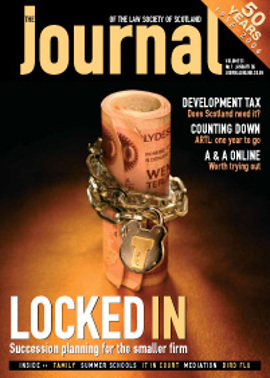Quiet revolutions

December revolutions
On 5 December 2005 the Civil Partnership Act 2004 came into effect and the first civil partnership registrations in Scotland took place on 20 December. The importance of these events cannot be overstated. The 2004 Act is the most significant development in family law for over 100 years. Paradoxically, however, though the Act covers a vast range of issues, including tax and social security, pension and property sharing, damages on death, domestic violence, occupancy rights, housing and tenancy succession, bankruptcy, aliment, immigration, family breakdown and relationships with children, there is nonetheless virtually no new law for practitioners to learn. Anyone familiar with the rules of marriage needs only to remember the simple point that civil partnership is for same-sex couples while marriage is for opposite-sex couples. The 2004 Act does not alter any marriage rule, nor affect that institution in any way but one – it removes the uniquely preferred position of marriage and thus the ability of heterosexual people to say to homosexual people: “we are better than you”.
On 15 December 2005 the Scottish Parliament finalised another family law revolution when it completed its consideration of what is now the Family Law (Scotland) Act 2005. I have no doubt that, here and elsewhere, I shall be commenting for some time to come on the detailed provisions of this important piece of legislation, but it is worth mentioning here the fundamental changes being made in relation to cohabitation. For the first time, protection is given to those who have reasonable expectations of sharing in the wealth generated during an informal relationship or who are in fairness deserving of a return for their efforts towards the family. This is clearly a revolution too far for some, but the Act leaves vast areas of discretion to the courts, which are charged with evolving the law to achieve justice within the bald framework set down by the Scottish Parliament.
The religification of Scottish family law
Family law used to be church law. It still is in many countries in the world to the detriment of, especially, their female citizens. But even in the secular modern age it would be wrong to describe Scottish family law as completely separate from religion. Ministers of the Established Church remain automatically celebrants (Marriage (Scotland) Act 1977, section 8(1)(a)(i)), and clerics of other churches and religious bodies are entitled to become celebrants. We recognise and accept religious ceremonies as creating marriages which have civil effects. One would have expected, however, that as time went by the separation of church and state, of family law and religious doctrine, would inexorably grow. But it seems that the reverse has been happening. We see this with a recent statutory development and with a recent decision of the Inner House of the Court of Session.
Where secular meets sacred
The statutory development is contained in the Family Law (Scotland) Act 2005. Sheriffs have been given an unprecedented power to postpone the granting of a divorce if one of the parties is refusing to set the other free. Of course in law it is not for the parties to “set each other free” but for the law to do so. The point, however, is that some religious bodies do not recognise civil (court-granted) divorces and so do not accept that a person who is (lawfully) divorced is free to remarry. The Roman Catholic Church (I understand) takes this position, but there is nothing the law can do since the position of that body is that no act of man or woman can terminate a marriage before death. Certain sections of the Jewish faith take the similar view that a court-granted divorce does not end a marriage, but differ from the Roman Catholic Church in accepting that the marriage can be terminated before death by the husband granting the wife a “get”, or religious divorce. It is the religious rather than the civil divorce that renders the (ex-)wife free to remarry in the eyes of her faith. She is, of course, whatever her faith says, free to remarry in the eyes of Scots law even before the granting of the “get”. But it sometimes happens that processes, legal and religious, are used tactically and for illegitimate reasons.
Were the legal system to maintain a complete separation of law and religion, it would deem itself entirely powerless to resolve that issue: it is a personal belief of the ex-spouse that she cannot remarry, not a belief of the law. But our legislators have determined that the Scottish courts should be able to intervene in this sort of scenario and section 15 allows the sheriff to “postpone” the granting of a divorce where the marriage has been proved to have broken down irretrievably, but (i) the applicant for such postponement is prevented from entering a religious marriage by virtue of a requirement of the religion of that marriage, and (ii) the other party is able to remove the religious impediment.
The provision probably promises more than it can deliver. Though the section is not worded in terms of “pursuers” and “defenders”, in situations in which there is real dispute it can benefit only defenders. It is the pursuer seeking a legal divorce but refusing to grant a religious divorce that the provision is aimed at. But if it is the defender who is refusing to grant the religious divorce, the threat of postponing the legal divorce plays into and strengthens the defender’s hand – at least if his defending is genuine. The defender may continue to refuse to grant the religious divorce and indeed may do so for extraneous reasons (such as to get more in the way of financial provision, or more contact with a child): in these sorts of cases it will not be in the interests of the pursuer to seek a legal divorce and at the same time ask for its postponement. And because religious divorces tend to be gendered (with the power to grant them in the hands of men rather than women), the provision limits its benefits to female defenders – it gives nothing to male defenders or to female pursuers. My prediction is that we will not see these new rules being operated often, if at all.
The meaning of consent
Case law has also recently brought family law and religion closer together. It has long been a rule of Scots law that marriage is based on consent, which must indicate a real intention to take each other as husband and wife. The outward manifestation of that consent (saying “I do” before witnesses and signing the marriage schedule) will normally be proof positive of that intention. But sometimes the outward manifestation does not indicate positive intention – as in the case of the forced marriage, which is no marriage because the consent is not real. But a different situation arises when no one forces parties to give the outward manifestation of consent, and they do so for a reason other than a genuine consent to marry, such as to defraud someone like the immigration authorities.
In Hakeem v Hussain 2003 SLT 515 Lord Clarke held that a couple who married in a registry office, signing the marriage schedule which was then registered, could not escape the marriage on the argument that, as good religious believers, they did not consider themselves married until a religious ceremony had taken place (which in the event did not take place). This was a good and sensible decision. The Inner House, however, has overturned it. In what is now called H v H 2005 SLT 1025 an Extra Division has held that while the parties consented to signing the marriage schedule, their religious faith meant that true consent to marriage was consent before God rather than consent before the registrar: as such the marriage was void for lack of consent and their fraudulent and irreligious scheme was reported to the Crown Office.
This is a dangerous decision. Many faiths which are well represented in this country do not consider the signing of the marriage schedule or its registering as making a “marriage” and parties do not see that consent as the “consent” required by the 1977 Act. What would happen if a religious marriage were undertaken a week before the civil registration, and one party died in the interim? Were they married? Not in law, whatever their own beliefs were and even if they had commenced living together as husband and wife. If genuine consent to marriage is more important than the forms in the 1977 Act, then we have revived the common law of irregular marriages which was repealed in 1939.
The root cause of these problems is the increasing unwillingness of Scots law to maintain that crucial separation between religious law and civil law. A much purer form of civil relationship has been created by the Civil Partnership Act 2004 which, I suggest, is the model that should guide future development of legal marriage for those who are denied, because of their sexual orientation, access to the 2004 Act itself.
Kenneth McK Norrie, University of Strathclyde
In this issue
- Pressing ahead
- Regulation, 2006 style
- Held to ransom?
- A world turned upside down
- Quiet revolutions
- For supplement read tax
- Why mediation is a bad idea, and other myths
- Advice in a Europe of many notions
- At the touch of a button
- What sort of courts do we want? (And when?)
- KM in practice
- If the bug bites
- Refreshing risk quiz
- The partnership must go on
- First duty to the court
- A difficult birth
- Nuclear power no thanks?
- Due diligence
- Will less mean better?
- Scottish Solicitors' Discipline Tribunal
- Website reviews
- Book reviews
- Back to the future
- Users' IT requirements for ARTL






